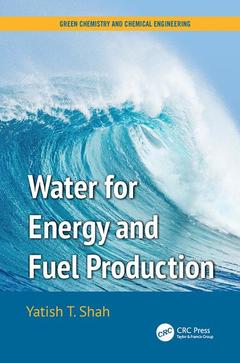Description
Water for Energy and Fuel Production
Green Chemistry and Chemical Engineering Series
Author: Shah Yatish T.
Language: English
Subjects for Water for Energy and Fuel Production:
Keywords
Aqueous Phase Reforming; Hydrokinetic Energy; Gas Hydrates; Fermentation Technologies; Hydrogen; Hydrogen Production; Hydrothermal Conversion; Steam Reforming; Supercritical Water; Water Gas Shift Reaction; Steam; Coal Water Slurry; Hydroelectricity; HTC; Fossil- and bio-based feedstock; Steam Gasification; Reaction medium; Geopressurized Zones; Water-based clathrate molecules; Dry Reforming; Water dissociation; Coal Bed Methane; Energy and fuel production; Reverse Water Gas Shift Reaction; SCW; HTC Process; HTL Process; SCW Gasification; SSF Process; SHF Process; Hydrate Dissociation; Monofunctional Groups; Methane Hydrate; Dry Pyrolysis; Microbial Electrolytic Cell
Publication date: 04-2017
· 15.6x23.4 cm · Paperback
Publication date: 05-2014
440 p. · 15.6x23.4 cm · Hardback
Description
/li>Contents
/li>Readership
/li>Biography
/li>
Water, in all its forms, may be the key to an environmentally friendly energy economy. Water is free, there is plenty of it, plus it carries what is generally believed to be the best long-term source of green energy?hydrogen.
Water for Energy and Fuel Production explores the many roles of water in the energy and fuel industry. The text not only discusses water?s use as a direct source of energy and fuel?such as hydrogen from water dissociation, methane from water-based clathrate molecules, hydroelectric dams, and hydrokinetic energy from tidal waves, off-shore undercurrents, and inland waterways?but also:
- Describes water?s benign application in the production of oil, gas, coal, uranium, biomass, and other raw fuels, and as an energy carrier in the form of hot water and steam
- Examines water?s role as a reactant, reaction medium, and catalyst?as well as steam?s role as a reactant?for the conversion of raw fuels to synthetic fuels
- Explains how supercritical water can be used to convert fossil- and bio-based feedstock to synthetic fuels in the presence and absence of a catalyst
Employing illustrative case studies and commercial examples, Water for Energy and Fuel Production demonstrates the versatility of water as a provider of energy and fuel, conveying the message that as energy demand and environmental concerns grow, so should our vigilance in pursuing the role of water in the energy landscape.
Introduction. Role of Water in Recovery and Production of Raw Fuels. Energy Recovery by Benign Hydrothermal Processes (ERP). Steam Gasification and Reforming Technologies. Hydrothermal Processes in Subcritical Water. Aqueous Phase Reforming and Bioforming Process. Biofine Hydrolysis Process and Derivative Product Upgrading Technologies. Anaerobic Digestion of Aqueous Waste for Methane and Hydrogen. Hydrolysis and Fermentation Technologies for Alcohols. Fuel Production by Supercritical Water. Water Dissociation Technologies for Hydrogen. Methane from Gas Hydrates. Power and Energy Directly from Water.
Yatish T. Shah received his BS from University of Michigan, Ann Arbor, USA and MS and Sc.D from Massachusetts Institute of Technology, Cambridge, USA. During his 40+ years of experience, he has served as chemical and petroleum engineering department chairman, dean of engineering, chief research officer, provost, visiting scholar, and visiting professor at ten different institutions. Currently he is professor of engineering at Norfolk State University, Virginia, USA. He is also an active consultant to numerous organizations in the energy sector. He has authored four books and over 250 reviews and refereed technical publications in the areas of energy, environmental, and reaction engineering.




